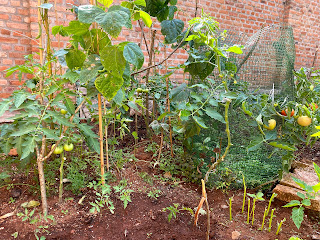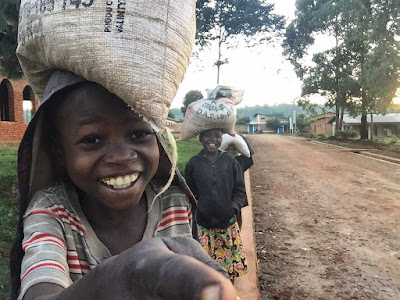(from Eric)
Over the weekend, some of us were talking about the recent lack of medical blogs. This is largely driven by the fact that, when you've done something daily for several years, you start to think "what is there to talk about? It's just everyday normal stuff." Not only is our daily work not-normal for the majority of this blog readership, but we in the daily grind need fresh ways to "see" what is around us, particularly when it proclaims goodness and hope, though the white noise of the everyday threatens to drown it out.
So, in that spirit, our first Case of the Week (COTW) in the last 11 months. =)
My first morning back on Internal Medicine last week, my students guided me to the bedside of a new patient. A young man in his early thirties, he had swelling on both sides of his neck that was quite painful, in addition to multiple weeks of fever and poor appetite. Just before coming to the hospital, he had gone to a local nurse-run health center, which had tested him for HIV, which was positive.
The students wanted to know if I knew what was causing this neck swelling. Yes. Yes, I do.
 |
| Note the swelling on the side of the neck and the skin breakdown where it had been oozing. |
Painful swelling of the lymph nodes on either side of the neck muscles in an untreated HIV+ patient with a couple weeks of fever and poor appetite in Burundi is about 99% certain to be Tuberculosis. In fact, he even had the classic matted appearance and evidence of past oozing fistulizations which are typical of TB. We put him on TB medications (which are free) and contacted our HIV nurses to come and get him into the system to start ARVs in the next couple weeks (which will be free). He slowly started to feel stronger and we let him go home yesterday, but he'll return in a week to start HIV medications.
***
For me, this guy is about as simple as my cases get, but I peel back the veneer of a To-Do list checkbox and find a number of things to celebrate:
1. THE PATIENT: This young man is probably going to do great. Yet without a proper diagnosis and the medications for his problems, he would likely die, from his TB alone, even more so from HIV. His TB is curable. With proper treatment, he can live a long and healthy life with his HIV. It is a changed life, and I got to be a part of it.
2. PEPFAR: I don't think that most Americans are aware that the US has spearheaded the largest global health effort against a single disease (until Covid) via PEPFAR, which is the US President's Emergency Plan for AIDS Relief. It was started in 2003 by George W. Bush, and has continued since then. This fund has provided care in over 50 countries and is estimated to have saved over 20 million lives, largely in Sub-Saharan Africa. The US is not extraordinary in regards to foreign aid compared to other rich countries, but PEPFAR is a great example of something America has done that has truly changed millions of lives.
15 years ago, medicines for HIV would likely have been unavailable for this young man. Around 10 years ago, it was found that, if someone is well treated with ARVs for their HIV, their ability to spread it to someone else drops dramatically, which has caused policy makers to try to get everyone with HIV on treatment, since it was prevention as well as treatment. Now, though considerable challenges exist in implementation, the difference feels palpable to me. Yes, this guy came in with previously undiagnosed HIV, but these cases feel increasingly uncommon. This is a very good thing.
3. EDUCATION: I don't know the mental image of the above story that automatically comes to you. But if it didn't include the white coats of at least 15 trainees or various stripes (medical, nursing, allied health), then it wasn't accurate. All of this was an opportunity for these growing professionals to see a problem that they should be able to correctly diagnose and manage the next time. HAU currently has hundreds and hundreds of graduates that trained at Kibuye that are now working all over the country and the region, and this was another small moment to help them to do that future work better.

















































